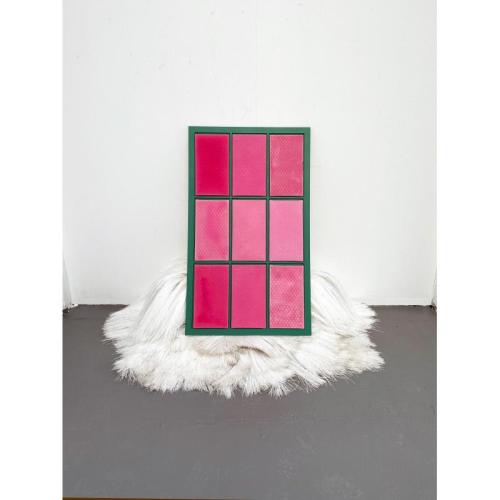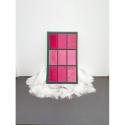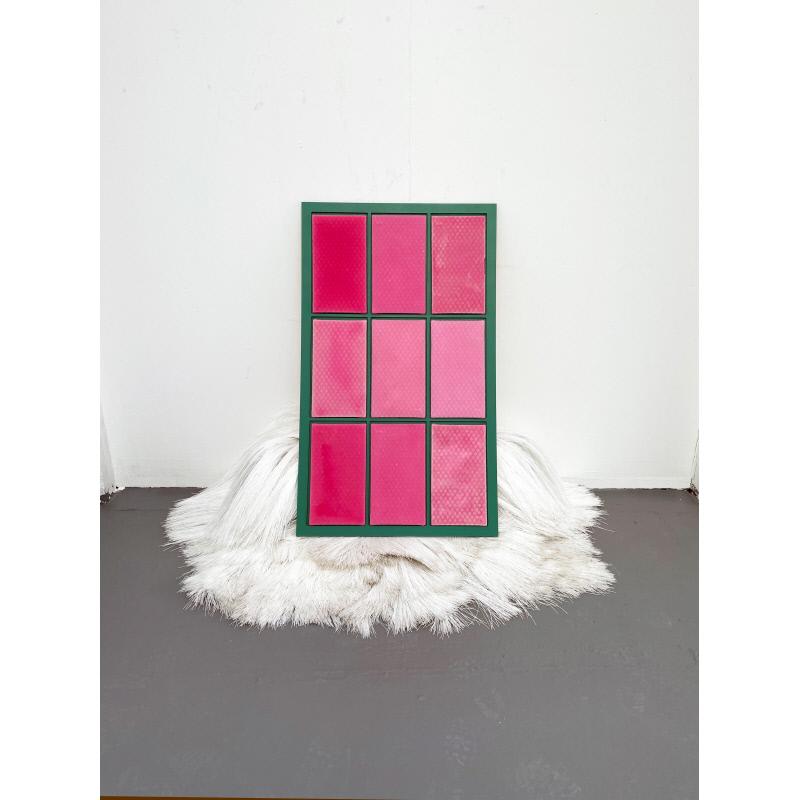Thought Couture, Third Revolution (Validity’s Secret)
Collection:UAL Art Collection
Date: 2021
Artist: Matilda Laird (British)
Dimensions:
(Board) 72cm x 122cm x 2cm, (Brushes) 110cm x 65cm x 35cm
Medium: Wax, MDF, emulsion paint, felt, car wash brushes
Object number: UAC 1048
DescriptionMatilda studied BA Sculpture at Camberwell College of Arts. She says:
'My multidisciplinary practice includes sculpture, installation, performance, drawing, video and digital drawing. My generally large scale architectural works address broad themes of consumerism and the manipulations of retail. With focus on ideas of elevation and display, I appropriate a retail aesthetic as a means of critiquing a retail aesthetic.
Shop windows and adverts play on desires through attractive colours and seductive materials. I am interested in this control that colours and materials can have, and in my own work aim to create a similar seduction.
I take colour schemes from fashion house campaigns. However, paired with different forms and materials these colours can symbolise different things. This is where my work starts to look at the gratuitous boundary between ‘high’ and ‘low’ art and aesthetics.
I enjoy making work that evokes a strong and varied sense of symbolism. I find it interesting how specific arrangements of colours and materials can symbolise certain things, and even more interesting that subtle changes in arrangement can change the symbol altogether. For example, a length of light pink neoprene draped over some ply wood could symbolise a fairy-tale wedding table, whereas that same fabric tautly attached to the wood could resemble a designer hand bag.'
'My multidisciplinary practice includes sculpture, installation, performance, drawing, video and digital drawing. My generally large scale architectural works address broad themes of consumerism and the manipulations of retail. With focus on ideas of elevation and display, I appropriate a retail aesthetic as a means of critiquing a retail aesthetic.
Shop windows and adverts play on desires through attractive colours and seductive materials. I am interested in this control that colours and materials can have, and in my own work aim to create a similar seduction.
I take colour schemes from fashion house campaigns. However, paired with different forms and materials these colours can symbolise different things. This is where my work starts to look at the gratuitous boundary between ‘high’ and ‘low’ art and aesthetics.
I enjoy making work that evokes a strong and varied sense of symbolism. I find it interesting how specific arrangements of colours and materials can symbolise certain things, and even more interesting that subtle changes in arrangement can change the symbol altogether. For example, a length of light pink neoprene draped over some ply wood could symbolise a fairy-tale wedding table, whereas that same fabric tautly attached to the wood could resemble a designer hand bag.'




